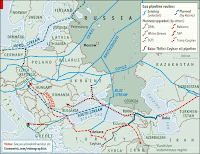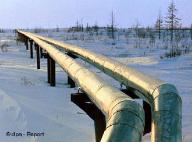 The Swedish government's decision to accept the disputed gas pipeline NordStream has caused debate. Is the Russian-German gas pipeline a security policy threat to vital Swedish interests? Or is it a project that safeguards stability and development in Russia? In a recent interview by Andreas Henriksson from political web journal makthavare.se, I try to put some of these questions into perspective.
The Swedish government's decision to accept the disputed gas pipeline NordStream has caused debate. Is the Russian-German gas pipeline a security policy threat to vital Swedish interests? Or is it a project that safeguards stability and development in Russia? In a recent interview by Andreas Henriksson from political web journal makthavare.se, I try to put some of these questions into perspective. Vilhelm Konnander participated as one of the lecturers at the Fokus magazine conference "When technology changes politics" a few weeks ago, where he spoke at the Global outlook seminar. He is also one of the authors of the international blog gateway Global Voices, and has both professionally and privately followed developments in Russia for a long period of time. Makthavare.se asked him to give his views on the gas pipeline, and also account for the role that Russian gas and oil giant Gazprom plays in current Russia.
Q: How do you think that the Russian political leadership looks at the gas pipeline? Is it an important project for them from a strategic and geopolitical perspective, or is it a more downright economic project that carries its own merits and might have fallen had Swedish resistance been to great?
A: It is time to rid ourselves of blinders concerning the Nordstream issue. For Russia, NordStream and energy exports is a classical question of domestic foreign policy. It is about fattening a system that rests on a far-reaching political and economic symbiosis between competing political and economic élites, which seek to monopolize political and economic power. And the loyalty of élites is dependent on the incomes from oil, gas, and other raw materials, and how these profits are divided.
A: It is time to rid ourselves of blinders concerning the Nordstream issue. For Russia, NordStream and energy exports is a classical question of domestic foreign policy. It is about fattening a system that rests on a far-reaching political and economic symbiosis between competing political and economic élites, which seek to monopolize political and economic power. And the loyalty of élites is dependent on the incomes from oil, gas, and other raw materials, and how these profits are divided.
Extenstive regulations, taxation, and charges on the domestic market, has put the Russian energy industry in a position where the largest profits are made on foreign markets. For example, the internal Russian price on gas has, at times, been as low as a mere 3 percent of the export price. In the course of time, Gazprom's export incomes have varied between 50 and 70 percent of the business conglomerate's total revenues, despite the fact that substantially lower gas volumes have been delivered to Europe than to the domestic market. The Russian élites have thus enveloped itself into a so great dependency to divide the spoils of energy export revenues that it has become an integrated part of the country's informal system of government.
Q: And what would be the consequences of that?
Today, Russia's political stability is dependent on stable energy export revenues. In the event that this money flow is stopped - especially in times of economic crisis - it may subvert or threaten the political stability of the country.
The link between falling energy prices and Russian systemic collapse is obvious, regardless of whether one speaks of the fall of the Soviet Union or the financial crisis in the wake of which Putin came to power. Therefore, the effects of the international financial crisis is now all becoming resemblant of a fight for life or death to get hold of a piece of an ever diminishing cake. The consequences of Russian domestic political instability are still unclear, but increasing Russian desperation might cause greater uncertainties in the foreign and security policy area - in contrast to the clarity and predictability of recent years.
Q: What then might we expect from or great Eastern neighbour in the future?
A: In this perspectve, NordStream is, of course, important, but a basic mistake from the Swedish horizon is to constantly depart from very obscure geopolitical perspecitve, at the same time as the fundamental Russian domestic motives behind the project either are put in the background or regarded as purely economic.
In the interplay between politics and business, NordStream and similar projects are strategically vital for Russia, and here the domestic driving forces marginalise any potential foreign policy considerations - especially concerning a country like Sweden, which is hardly visible on the Russian political map. Continued Swedish resistance to NordStream would therefore be regarded as a ridiculous source of irritation from a Lilliputian country in the European periphery.
Q: In Sweden, NordStream has been thoroughly discussed, mostly from a critical perspective, by representatives of both the political blocs. Do you think that the NordStream management - and consequently the heavy political actors behind i in Russia and Germany - have paid any attention to Swedish critique, or would they have built the pipeline no matter what the Swedish government would have thought and said?
A: That Russia and Germany would have shown any greater consideration of Swedish critique is not very probable. Some considerations may well be made as for the stretch and makeup of the gas pipeline, and Sweden may surely also grumble and protract the issue if desired, but eventually both Moscow and Berlin counts on the Swedish government coming around. It is one thing if Sweden throws gravel into the Russian machinery, but to oppose both Russia and - above all - Germany will prove difficult in the long run.
Q: How important is NordStream, in your opinion, to Germany?
A: All since Willy Brandt's Ostpolitik was launched in the 1970s, Berlin and Moscow have enveloped into a mutual dependency according to the formula "change by rapproachment," where gas deliveries to Germany has become the basic ingredient in the political concepts of both continental powers.
Even if Angela Merkel's (the German Chancellor) enthusiasm towards the project is more controlled than her predecessor's , Gerhard Schröder, who by the way is on Gazprom's payroll, the realization of the gas pipeline is central to future German-Russian cooperation. That Germany, in current times of economic crisis, would terminate a project, which ensures long-term, secure, and cheap gas deliveries, would be very surprising - both from a political and a financial perspective.
Q: How politically directed is the Russian gas and oil giant Gazprom?
A: The question should perhaps rather be how economically directed the Kremlin is by Gazprom. That both Russia's president, Dmitry Medvedev, and on of the country's previous Prime Ministers, Victor Chernomyrdin, have been chairmen of Gazprom should be a clear indicator. Despite privatization attempts during the 1990s, Gazprom has remained a state gas monopoly with great influence on political power. With increasing political control over so called strategic resources, Gazprom has served as a tool for quasi nationalizations of remaining private gas and oil companies, why its position has been all the more strengthened. The question about Gazprom and the Kremlin is like tha classical question about the hen and the egg: Which one came first?
Q: To what extent would you say that Russia is using its great oil and gas resources as an instrument of foreign policy power?
A: Rhetorics about Russa as an energy superpower have, in recent years, almost become a mantra for Russian leaders, as a way of strengthening national self-images and confidence. However, judging from results, it is hard to show that Moscow is using energy as a direct foreign policy tool. Seen frlom an economic and domestic political viewpoint, the energy issue is, however, currently part and parcel of almost all Russia's conflicts with its neighbours in recent years - Estonia, Ukraine, Lithuania, and Georgia.
What is interesting is, however, to look at how Moscow indirectly uses energy as a means of strategic manipulation. With the help of energy, foreign policy advantages and concessions are simply achieved in other areas than exactly the one that each conflict focuses on. Energy is used indirectly rather than directly as a foreign policy tool, where domestic politico-economic considerations often determine foreign policy action.
Q: What do you think about the Swedish debate about NordStream? Is it substantially mostly correct or is it mared by antiquated Swedish fears of the Russians?
A: When Nordstream is addressed in Swedish debate, it is not hard to make up an image of a security policys establishment, where old realist political views are mutually confirmed and reinforced - no matter whether it is about security policy reservations or pretexts for the very same kind of perspectives. The interesting thing is not what is actually said, but what is not said.
Fundamentally, Sweden is faced by a catch 22 concerning the gas pipeline. Should one seek to undermine Russia's political stability by torpedoing the NordStream project, with increased Russian security policy unpredictability as a consequence, or should one indirectly contribute to support the continuation of a corrupt and authoritarian regime, of which one at least knows what to expect? That is a question that gets little or no attention.
Q: As you see it, is there something we in Sweden have misconstrued in the security policy and geopolitical judgement of NordStream?
A: We, basically, pose the wrong questions about NordStream, and consequently get all the wrong answers. As long as the Swedish political and security policy establishment is dedicated to self-binding about the question of our relations to Russia - regardless of whether it concerns NordStream or general approaches - we risk ending up with the wrong conclusions. As 20 years have passed since the fall of the Berlin wall, it is possible that we as little now as then might predict fundamental changes in Russia. Still, the invasion threat from the East returns in various forms. From military threat to criminality, from criminality to refugee invasion, from refugee invastion to epidemics, from epidemics to energy. The list is long, but what has become reality?





